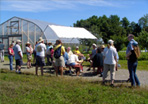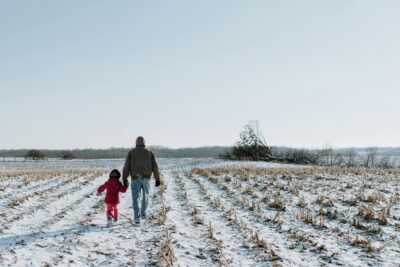Troy, Maine
Striving to meet the demand for good food in Maine

Known more for its lobsters than its pasture-raised turkeys, Maine is a state with a highly diversified local food production system with more and more family farms meeting the growing demand for local food. To help figure out how to do this, Maine’s farmers are turning to the Maine Organic Farmers and Gardeners Association (MOFGA) for advice, and marketing and technical support to make their farms more profitable and more sustainable.
Farm Aid’s ally for a number of years, MOFGA is a statewide organization of 6,000 members dedicated to helping Maine farmers transition to more sustainable growing practices and increase local food production. MOFGA was the first organization in the country to provide technical assistance in organic farming and gardening, and it is the oldest and largest state organic organization in the country. Since 1971, MOFGA has helped hundreds of farmers solve growing problems, improve their soils, and market directly to consumers.
MOFGA also illuminates the connections for consumers between good farming practices, healthful food, and strong local economies. Currently, MOFGA is working with the Maine Council of Churches on a campaign to increase the number of CSA farms (Community Supported Agriculture – where individuals buy a “share” of the farm’s production and in return get a weekly box of fresh food) and the total number of CSA shares available in the state. “After an initial survey of what exists in Maine right now in terms of CSAs, it’s obvious that the trouble is on the supply side,” says Melissa White, MOFGA’s organic marketing coordinator. “We need more farmers and more production to meet the growing demand for locally grown fresh food.”
And Maine’s farmers are responding. MOFGA members Bob and Kathy Perol run Diversity Farm, a 230-acre organic, grass-based livestock farm in Troy, Maine. They raise pork, turkey, chicken for meat and eeggs, and are introducing dairy cows to produce their own cheese. Diversity Farm is different from a conventional farm in the way it raises its animals. Rather than feeding animals grains, which is not their natural diet, the animals are raised on pasture, and grass is their primary feed. In turn, animals build up the soil and increase its fertility by naturally spreading their manure. As awareness grows about the health benefits of grass-raised meat -higher levels of beneficial Omega 3 fats for example – so does the demand.
“More and more people around here tell me they want to know where their food comes from and who grows it,” Bob said. “They’re going into retail stores and asking the owners: ‘Do you know the farmer who grew this food?’ They’re trying to find out their food connection. There’s so much demand right now that we can’t keep up with it.”
These are busy days for the Perols. With Thanksgiving around the corner, Bob and Kathy’s customers were smart to order their grass-fed organic turkeys months ago. As word spreads about the taste and juiciness of the meat, the Perols are very busy trying to keep up with the orders. “Our food sells itself, to be honest with you,” said Bob. “Once folks taste our product, they never want to go back to what they were eating before. Tasting is believing.”
Over the past eighteen months, Bob and Kathy have doubled their production in order to meet demand – but they still can’t meet it. MOFGA has several programs to nurture the next generation of farmers and increase their number, but that takes time. There are many challenges, such as the availability and affordability of farmland for young people with little equity. But MOFGA is up to the challenge, working with its members like Bob and Kathy Perol to guarantee a future supply of farmers who can grow the food that more Americans are demanding.



